- Home
- Theodora Taylor
His to Own: 50 Loving States, Arkansas Page 30
His to Own: 50 Loving States, Arkansas Read online
Page 30
Which is not the same as saying I’d never dated anybody on his team, but luckily Beau accepts that as my final answer. He seems disappointed though.
“Damn, I was hoping that would solve the mystery. I know I’ve heard your voice before. I just can’t remember where.”
“Tell me when you figure it out,” I answer again, this time putting way more effort into keeping my voice light than in schooling my face to look innocent. Wow, I must really be getting used to being a home aide for a blind person. I’m even lying differently nowadays.
“I’ll do that,” he says to my back as I rush out of the room.
I hope he’s wrong. I hope he never figures it out. Because if he does, then it will all be over, this job, the small relationship I’ve managed to build with him, my friendship with Josie. And that is something I can’t abide even thinking about—
My frantic thoughts are interrupted by the sound of my phone beeping with a text message. I stop in the hallway to take a look.
It’s one line from Colin. A house number, the name of a road, and a zip code. And somehow this text scares me even more than Beau figuring out who I really am.
Chapter 17
True to his word, Colin doesn’t bring it up again. He calls me every day, just like before, and we talk about stuff that doesn’t have anything to do with his invitation to meet up with him when he returns to Nashville. Things like all the places he’s been traveling on his world tour, current events, what we’ve been watching on Fyos, the movies we want to see, the sitcoms that make us laugh. Our mothers.
Colin tells me his dad left him and his mom when he was eight, “for his real old lady, Booze.” He tells me about how his mother worked her fingers to the bone at various minimum wage jobs to provide for him. And when it turned out Colin was a violin prodigy, she took a live-in servant job with a family of rich assholes so she could use the money she saved on rent to get him the training he needed.
“A family of rich assholes.” That’s what Colin calls them. And of course I know he’s talking about the Lancers when he describes them as a pack of snobby, well-groomed demons who never worked a day in their lives, thanks to the dad being the only son of an oil baron. However, according to Colin, the older Lancer’s lack of employment didn’t stop him from thinking he truly deserved everything that had been handed down to him, and he’d taught his only son to expect the same. Colin tells me Mike was only a few years older than him, so he had to spend nearly his entire childhood under that prick’s entitled thumb, taking his shit so his mother wouldn’t lose her job.
When I make the comment that living with a guy like that must have been hard for him, he tells me it was harder for his mother. That’s why he bought her a big house across the street from that family with his first big royalty check.
I think I know the house he’s talking about, and I go to my attic window to peep out at the sprawling white colonial down the street. It looks just like the Lancer Colonial, except it’s both taller and wider, like its whole point in life is to overshadow the house sitting across from it. I can see why Colin bought it for his mom, but I feel a little sad thinking about her rattling around that big old house by herself.
Colin says he thinks she enjoyed living like the people she used to serve. But he could only guess because Rose Gaither wasn’t the type to lord it over others, even though she had every right to do just that.
“She lived in that house for most of the rest of her life. But after she got sick, I bought her another house in Nashville so I could visit her more often when I was in town. That was a mistake. I should have come off tour. Stayed there with her. If I’d known…”
“Hey, you had no way of knowing,” I say, gripping the phone when I hear the sadness in his voice. “Your mom might have gone on a few more years whether you were there or not if she hadn’t filed that DNR, and I’m assuming she didn’t tell you about that.”
“No, she didn’t. Probably cuz she knew I would’ve gone through the roof if I found out. Make her take it back.” Colin’s voice gets a little quieter now. “But she’s always been stubborn. Always wanted to do things her way. I guess I got that from her.”
“There are worse ways for a mom to be,” I tell him, thinking about Valerie. “Believe me.”
“Sounds like you got a story to tell about your mother, too.”
My first instinct is to change the subject, to make this another one of those things I’m not telling him about. Like Mike. And Beau. Or how I’m looking right at his mama’s old house as we speak. But he finally opened up a little to me about his mom, and it feels like I should pay that back.
“What mother?” I joke, trying not to sound as bitter as I am about the situation—and failing. “There’s only Valerie Goode, and she never admits to having a daughter.”
“Where have I heard that name before?”
“Did you see that documentary, Standing Back, about back-up singers that won the Oscar a few years ago?”
“Goody? Goody’s your mom!?”
I can tell from his tone that he’s finding it hard to believe the flamboyant back-up singer, who recounted her struggle to find recognition with such humor and flair, is actually my mother. It probably doesn’t help that as much time as the filmmakers gave to her story, she doesn’t mention having a daughter. Not even once. Just “real disapproving parents from West Tennessee.”
“Technically yes,” I answer Colin. “But we don’t have a lot in common.”
“So that story she told about trying to make it as a country music singer before she moved to Los Angeles…”
“Yeah, that’s true. She just forgot to mention I was her backup singer and guitar player.”
I think about how she only provided the filmmakers pictures of her solo in her cowgirl outfit. It had been enough to make me wonder if I had actually been in Alabama with her. Made me touch my scar, the only real proof I have of the time we performed together, just to make sure it was still there.
I’ve never told anyone else that story. Your mom not mentioning you in the documentary someone did about her and other backup singers lives isn’t something you go around bragging about. And my family, the only other people I’d tell it to, already know. They also know my mother isn’t a subject I like to talk about.
But Colin, with his twisted sense of humor, has the perfect response. “That’s going to be a hell of a song when you finally write it,” he says, like I’ve won the songwriter’s jackpot.
Over the next few weeks I have a real hard time keeping all my secrets to myself. Colin’s got a way of making me want to tell him everything, even though I know it will be the end of whatever this weird thing is that’s building between us if I do.
The grandma-confusing gifts that keep arriving in the mail don’t help either. A package of hokey guitar picks with koalas, kangaroos, dingoes, and other Australian animals printed across their fronts. A state-of-the-art recording microphone he said he “just found” in one of Tokyo’s electronic districts. And an original pressed vinyl single of “(Love’s) Ring of Fire.” The one recorded by June Carter Cash’s sister, Anita, that he’d found while rummaging through an old record shop in London.
“Thank you,” I tell him when he calls me from Scotland, “I don’t have a record player, but I’m going to figure out how to listen to it.”
Two days later, my grandma calls to tell me an Amazon package with a portable Crosley record player just arrived. She’s not even trying not to open my mail these days, and I’m afraid Colin’s re-created a monster.
“When are you bringing this boy around to see me?” she asks for the umpteenth time. “He’s obviously trying to court you with these strange gifts he be sending.”
“He’s not…” I stop myself there, because I can’t really explain what Colin is doing to myself, much less my grandma.
“Thank you for the record player,” I say the next time Colin calls. “But you’ve got to stop sending me things. My grandma keeps saying I need to bring you
around to meet her because she thinks you’re courting me or something. Not to mention, I’m going to have to retrain her not to open my mail after all this is done.”
“Is this the same grandma you claim makes better chicken than Josie?” he asks.
The very next day a stack of Gospel records from an Edinburgh record shop arrives in the mail addressed to “Purple’s Grandma.” And every single one of them has a version of “Go Tell It On the Mountain.”
“I like this boy,” my grandmother tells me when she calls with one of the records playing in the background on the new Crosley. “If you don’t bring him for Sunday Dinner soon, you go’on to hear about it from me.”
Colin gets me in trouble with my grandma. He pisses me off. He makes me laugh. Sometimes I wish I’d never agreed to do this friendship thing with him for Josie. I look forward to his calls every day.
Meanwhile, the last week in September gets closer and closer and Colin continues not to bring it up. Not even on the Monday before the Tuesday he’s set to fly back from the European leg of his tour. He calls to tell me he’ll be leaving Norway before I wake up and won’t be landing in Nashville until after midnight on Tuesday. Then he has a bunch of interviews on Wednesday, so he might not be able to call me until Thursday.
He tells me this and I say, “Okay, talk to you Thursday, then,” doing my best impression of a person who is not going crazy at the thought of us skipping just one phone call after a 100-plus day streak.
“Hope so,” he says. Like whether we talk or not is up to me, not him, even though he’s the one who’s supposed to be calling next. “Bye,” he says.
“Bye,” I answer softly, hoping he doesn’t hear what feels like something cracking apart inside of me.
He doesn’t call on Wednesday, and I resolve not to think about it. I tell myself I’m looking forward to a lazy weekend. Beau and Josie are flying with Josie’s best friend, Sam McKinley, to set up a second Ruth’s House location in Indiana. And I don’t have to drive up to Tennessee this weekend, because my cousin, Darnell, is driving my grandma and Auntie Beulah Mae up to St. Louis to visit family and maybe gamble some at the casinos.
For once, I don’t have anything planned over the weekend, which means I can spend it however I want, doing whatever I want. Maybe I’ll call Bernice and we can have the long conversation we’ve been promising to have with each other, ever since I moved down to Alabama.
In any case, I should just go on ahead and erase that text Colin sent me with the address. Because that was a weird conversation. With his crazy sense of humor, who knows if he was even serious? And even if he was, I’m definitely not going up there.
But I don’t erase the text.
Eventually Thursday comes. I drive Beau and Josie to the airport. Hug them good-bye, because at some point in the last few months we’ve become the kind of employee/employers who hug each other good-bye. Then I go home, and instead of erasing that text, I start working on a few songs that have been rattling around inside my head.
One of them I even get flushed out into a full version. I’m about to start working on a second song, but my stomach starts cramping. Not an early period, which I don’t really have anymore anyway since my “lady doctor” put me on birth control to regulate them. No, it’s hunger, I realize when I look up from my journal and see it’s almost dark outside my attic window. I haven’t eaten since the early breakfast I made for Josie and Beau before I drove them to the airport.
I should eat, I think. But the first thing I do is check my phone. There’s no missed call message on the front screen. Not even a text.
Colin still hasn’t called.
I set the phone down. Tell myself I’m stupid for this. Stupid for the sharp pain inside my chest. Stupid for caring. I remind myself why I called Colin in the first place. I remind myself it’s not supposed to be like that between him and me. He’s a kiss I had no business having at the age of fifteen. He’s a job I’ve taken on at Josie’s request. A client—he just doesn’t know it.
I remind myself that I’m hungry and not thinking straight, and that I should eat. Really, that’s all I should be thinking about now. Eating…
Then I grab my keys.
Chapter 18
A little over three hours later, I’m fairly sure my car’s old navigation system has gotten me in trouble again. I figured when the city name of Marrington came up after I put in the address and zip code, I’d end up in another tony Nashville suburb. But my 90s era nav system is now taking me down the main road of what looks like one of those white-only, small Tennessee towns that my Paw Paw used to warn me to never stop in, even if I needed gas.
Which I do. I only have about a quarter tank left and no idea how far away it is to the next decent-sized, race-tolerant city.
“Turn right at the next road,” the nav system tells me in a posh British accent.
I do what it says, but know it must truly be taking me some place I don’t want to go when I find myself on a long, unlit access road, blanketed by ominous dark woods on either side. Unfortunately, the road is too narrow to turn around on, so I keep going, hoping I’ll eventually find a space wide enough to make a U-turn.
“You have reached your destination,” the nav system informs me when I pull into a circular clearing with a log cabin that’s even smaller than the one I share with my grandma in West Tennessee.
“You must have lost your damn mind,” I say to the nav system, because there’s no way this cabin is where Colin asked me to meet him. The surrounding woods would probably provide plenty of game if you had a mind to hunt, which Colin told me once he likes to do in his off time. But the cabin itself looks like it’s one surprise county inspection away from being condemned, with a rusty tin roof and rotting wood planks lining both the porch and the house itself. It’s too ugly and tiny to be Colin’s house, even if he is only using it as a vacation home for hunting trips, like I’ve heard a lot of country stars do.
I sit there, staring at the house, feeling like an idiot. I’d been in such a rush to get out of Beau and Josie’s house before I changed my mind, that I’d left my phone charger behind, which means I either have to take my chances that whoever lives here is willing to point me toward a gas station at—I glance at the car’s clock radio—at almost nine o’clock at night, or I have to find a gas station on my own, which might leave me stranded without a phone.
Two choices. Neither of them very good.
And then the sky cracks open and starts pouring down rain.
I cuss and kill the engine, figuring that knocking on this cabin door and finding some backwoods hillbilly inside is a better option than stranding myself on the side of some unknown road without a phone in pouring rain. Maybe. Possibly.
I get out of the car, wishing I’d taken Josie up on that offer to take a self-defense class at Ruth’s House.
“Please don’t be a racist backwoods killer. Please don’t be a racist backwoods killer,” I whisper-chant as I run through the cold September rain toward the cabin’s front door.
To my surprise, the door opens before my feet even touch the stairs leading up to the front porch. A tall figure fills up its frame.
I stop, eyes popping wide when I see who it is.
“Hell, Purple, I was beginning to think you weren’t ever going to come.” Colin says. It’s only been a few months since I saw him in person, but he seems even taller than I remembered. More rugged, too, with a few days worth of beard growth. He holds out a large hand to me.
“Come on in here now, and get out that rain.”
Chapter 19
Fifteen minutes later, I’m sitting in front of a roaring fire watching Colin make me a dinner of steak and eggs in a kitchen that’s not so much another room in the small cabin, but an old gas stove and a few cabinets in one area of it.
The cabin is not much better on the inside than it is on the out, and from what I can tell, it only has one other room. A bathroom, so dated, I’d been relieved to find out the toilet actually flushed w
hen I used it a few minutes ago.
There’s a full-sized bed on the other side of the main room, with a brass rail frame and what looks like a well-made quilt lying on top of it. The quilt’s the only pretty thing I’ve seen so far in the entire cabin.
And, the only other positive thing I can find to say about this place is it’s very clean, with no obvious dust on any of the surfaces and a fresh woodsy smell about it, like maybe it was aired out for a good long while before I got here. Somebody also must have bothered to clean the windows, because I can clearly see the rain pounding against them on the other side.
The sizzling sound of the steak Colin’s making for me interrupts the rain’s steady patter, and I look up from the couch to watch him move around the kitchen area. His long body stretches underneath the varsity Charlie Daniel’s t-shirt he’s wearing, and I see a flash of his hard abs as he reaches to get a plate out of the cabinet. He’s not as cute as Beau, I think. Not so outrageously handsome.
But he’s got an air about him that Beau doesn’t. A confidence Beau could never have, because he knows how to do for himself in a way Beau just doesn’t. I say this, not because Beau is blind now, but because of the way I know he grew up. He went straight from a genteel Southern household to a career as a starting quarterback. I don’t think Beau’s ever even made himself a bowl of ramen. And I know, blind or not, he’d never be able to cook anything for Josie that smelled even near as wonderful as the plate of steak and eggs Colin sets down on a small wooden table in the kitchen area.
“You want to get changed out of those wet clothes before you eat?” he asks me.
“I’m fine,” I answer, getting off the couch and coming over to the table.
I haven’t quite figured out how to tell him I didn’t bring an overnight bag with me, because even as I was driving here, I still wasn’t 100 percent sure I was going to stay.

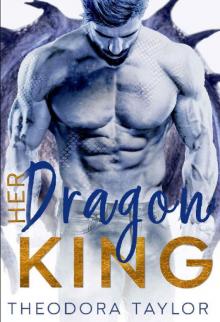 Her Dragon King (Her Dragon King Duet Book 2): 50 Loving States, North Dakota Pt. 2
Her Dragon King (Her Dragon King Duet Book 2): 50 Loving States, North Dakota Pt. 2 HAN: Her Ruthless Mistake: 50 Loving States, Delaware (Ruthless Triad Book 4)
HAN: Her Ruthless Mistake: 50 Loving States, Delaware (Ruthless Triad Book 4)![Billie and the Russian Beast: An Enemies to Lovers Russian Hockey Player Sports Romance [50 Loving States, South Carolina] (QUARANTALES Book 2) Read online](http://i1.bookreadfree.com/04/billie_and_the_russian_beast_an_enemies_to_lovers_russ50_loving_states_south_carolina_quarantales_book_2_preview.jpg) Billie and the Russian Beast: An Enemies to Lovers Russian Hockey Player Sports Romance [50 Loving States, South Carolina] (QUARANTALES Book 2)
Billie and the Russian Beast: An Enemies to Lovers Russian Hockey Player Sports Romance [50 Loving States, South Carolina] (QUARANTALES Book 2) The Brothers Nightwolf Complete Trilogy: A Sci-Fi Shifter Paranormal Romance Box Set
The Brothers Nightwolf Complete Trilogy: A Sci-Fi Shifter Paranormal Romance Box Set Kel D'Rek; His To Claim
Kel D'Rek; His To Claim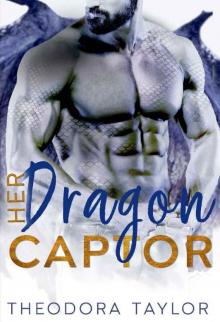 Her Dragon Captor (Her Dragon King Duet Book 1): 50 Loving States, North Dakota Pt. 1
Her Dragon Captor (Her Dragon King Duet Book 1): 50 Loving States, North Dakota Pt. 1 Phantom: Her Ruthless Fiancé: 50 Loving States, Kentucky (Ruthless Triad)
Phantom: Her Ruthless Fiancé: 50 Loving States, Kentucky (Ruthless Triad) Cynda and the City Doctor: 50 Loving States, Missouri (QUARANTALES Book 1)
Cynda and the City Doctor: 50 Loving States, Missouri (QUARANTALES Book 1)![Victor: Her Ruthless Owner: The VICTOR Trilogy Book 2 [50 Loving States, Rhode Island] (Ruthless Triad) Read online](http://i1.bookreadfree.com/i/03/16/victor_her_ruthless_owner_the_victor_trilogy_book_2_50_loving_states_rhode_island_ruthless_triad_preview.jpg) Victor: Her Ruthless Owner: The VICTOR Trilogy Book 2 [50 Loving States, Rhode Island] (Ruthless Triad)
Victor: Her Ruthless Owner: The VICTOR Trilogy Book 2 [50 Loving States, Rhode Island] (Ruthless Triad) LUCA_Her Ruthless Don
LUCA_Her Ruthless Don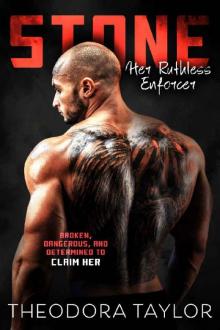 STONE: Her Ruthless Enforcer: 50 Loving States, North Carolina
STONE: Her Ruthless Enforcer: 50 Loving States, North Carolina His to Princess
His to Princess His for the Summer: 50 Loving States, Florida
His for the Summer: 50 Loving States, Florida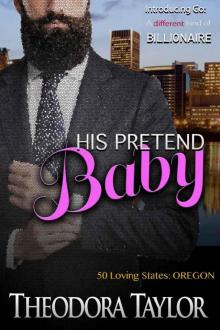 His Pretend Baby
His Pretend Baby Ruthless Tycoons: The Complete Series (Ruthless Billionaires Book 3)
Ruthless Tycoons: The Complete Series (Ruthless Billionaires Book 3) The Very Bad Fairgoods - Their Ruthless Bad Boys: A Smoking Hot Southern Bad Boys Boxset
The Very Bad Fairgoods - Their Ruthless Bad Boys: A Smoking Hot Southern Bad Boys Boxset AMBER_His to Reclaim
AMBER_His to Reclaim The Very Bad Fairgoods - Their Ruthless Bad Boys
The Very Bad Fairgoods - Their Ruthless Bad Boys Holt, Her Ruthless Billionaire: 50 Loving States-Connecticut (Ruthless Tycoons Book 1)
Holt, Her Ruthless Billionaire: 50 Loving States-Connecticut (Ruthless Tycoons Book 1) Victor: Her Ruthless Crush
Victor: Her Ruthless Crush HER RUSSIAN SURRENDER
HER RUSSIAN SURRENDER Wolf and Punishment (The Alaska Princesses Trilogy, Book 1)
Wolf and Punishment (The Alaska Princesses Trilogy, Book 1) Holt, Her Ruthless Billionairee_50 Loving States-Connecticut
Holt, Her Ruthless Billionairee_50 Loving States-Connecticut KNUD, Her Big Bad Wolf: 50 Loving States, Kansas
KNUD, Her Big Bad Wolf: 50 Loving States, Kansas His One and Only
His One and Only His Revenge Baby: 50 Loving States, Washington
His Revenge Baby: 50 Loving States, Washington Holt, Her Ruthless Billionaire_50 Loving States-Connecticut
Holt, Her Ruthless Billionaire_50 Loving States-Connecticut His Forbidden Bride: 50 Loving States, West Virginia
His Forbidden Bride: 50 Loving States, West Virginia LUCA - Her Ruthless Don (Ruthless and Obsessed Duet, Book 1): 50 Loving States, New York, Pt. 2 (Ruthless Tycoons 3)
LUCA - Her Ruthless Don (Ruthless and Obsessed Duet, Book 1): 50 Loving States, New York, Pt. 2 (Ruthless Tycoons 3) Her Russian Billionaire
Her Russian Billionaire Her Scottish Wolf (Howls Romance): Loving World
Her Scottish Wolf (Howls Romance): Loving World Luca - His to Possess: A Ruthless Scion Novella
Luca - His to Possess: A Ruthless Scion Novella ZAHIR_Her Ruthless Sheikh
ZAHIR_Her Ruthless Sheikh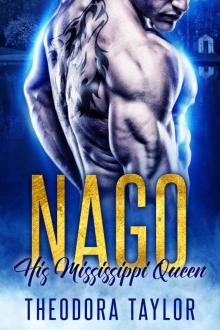 NAGO, His Mississippi Queen: 50 Loving States, Mississippi (The Brothers Nightwolf Trilogy, Book 1)
NAGO, His Mississippi Queen: 50 Loving States, Mississippi (The Brothers Nightwolf Trilogy, Book 1) His Everlasting Love: 50 Loving States, Virginia
His Everlasting Love: 50 Loving States, Virginia AMBER - His to Reclaim (Ruthlessly Obsessed Duet, Book 2): 50 Loving States, New York Pt. 2 (Ruthless Tycoons 4)
AMBER - His to Reclaim (Ruthlessly Obsessed Duet, Book 2): 50 Loving States, New York Pt. 2 (Ruthless Tycoons 4) AMBER_His to Reclaim_Ruthlessly Obsessed Duet New York Pt. 2
AMBER_His to Reclaim_Ruthlessly Obsessed Duet New York Pt. 2 His to Own: 50 Loving States, Arkansas
His to Own: 50 Loving States, Arkansas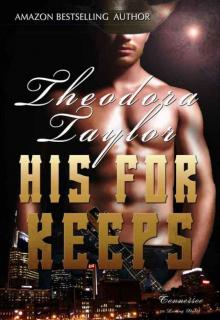 His For Keeps: (50 Loving States, Tennessee)
His For Keeps: (50 Loving States, Tennessee) Holt, Her Ruthless Billionaire
Holt, Her Ruthless Billionaire Love's Gamble
Love's Gamble Vegas, Baby
Vegas, Baby